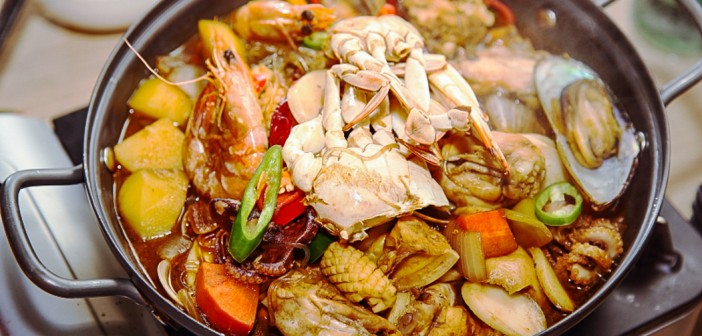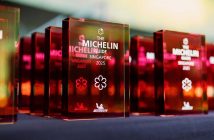In the wake of the K-pop wave that has swept across Asia, many Korean words have become familiar. In food-crazy Singapore, Korean cuisine has left its impact and expanded the common person’s culinary lexicon, as well as his waistline. From initial forays into kimchi, galbi and bugolgi to Hanwoo, Samgyetang and Jjigae, we Singaporeans have consumed it all.
Guksu Restaurant, which is located in Suntec City Mall, introduces a few more for us to get acquainted with. Having opened in late 2014, the restaurant has earned rave reviews for its namesake Korean noodles, Hankook style hotpots and a Mookata-like stew called Jeongol. Its calling card, though, lies in being Singapore’s first restaurant dedicated to serving authentic Jeongol.
Jeongol is a rich, soulful stew made to be shared amongst a group of friend or family, much like the sinicised hotpot that we are used to. This much beloved dish has a long history intertwined with that of Korea itself. From the fields of war to the imperial courts of intrigue, soldiers and statesmen alike stoutened their hearts and gridded their loins to this hearty stew.
Guksu Restaurant serves up 10 varieties of Jeongol, with a choice of seven types of broths which can combined in any fashion (70 combinations) to excite our taste buds.
 Looking like the dapper version of Sly and appropriately dressed Gangnam style, Mr Park Junho, General Manager, H Group Holdings (parent company of Guksu Restaurant) greeted us with a bright toothy smile and excitedly animated eyes.
Looking like the dapper version of Sly and appropriately dressed Gangnam style, Mr Park Junho, General Manager, H Group Holdings (parent company of Guksu Restaurant) greeted us with a bright toothy smile and excitedly animated eyes.
“This is our chef,” he gestured in large motions while introducing the head chef. “He is from Korea, and I am also from Korea”.
That proclamation was very reassuring to me. A nationally and culturally distinct cuisine such as Korean food is to me like imbibing the essence of a nation. What better way than to be guided by two Korean ambassadors of Hankook cooking, especially if the head chef, Kang Heunseong had worked in the lauded kitchens of the five-star Shilla Hotel and Ritz Carlton in Seoul, Korea.
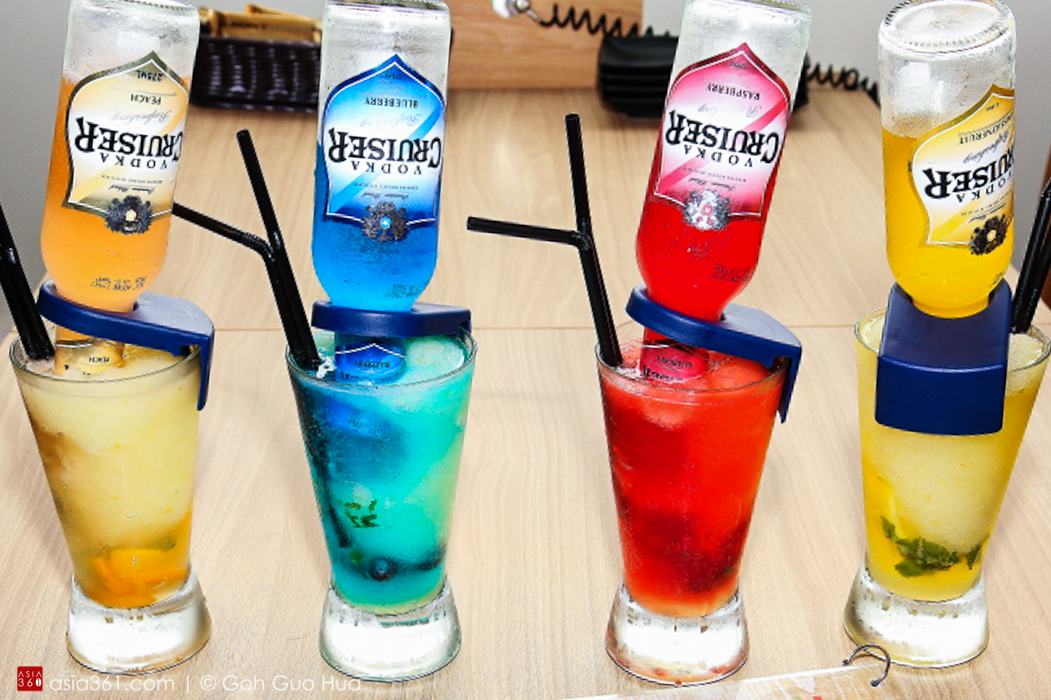 Starting off the evening we were introduced to four Korean lovelies. Looking like the meticulously groomed members of a Korean super group, Bunhong, Parang, Bbargang, Norang lined up in front of us from left to right.
Starting off the evening we were introduced to four Korean lovelies. Looking like the meticulously groomed members of a Korean super group, Bunhong, Parang, Bbargang, Norang lined up in front of us from left to right.
“Their names correspond to their colours,” Mr Park explained about the alcoholic beverages.
Mr Park went on to recommend the Haemul Jjim Dak and we chose the Daeji Gogi Jeongol.
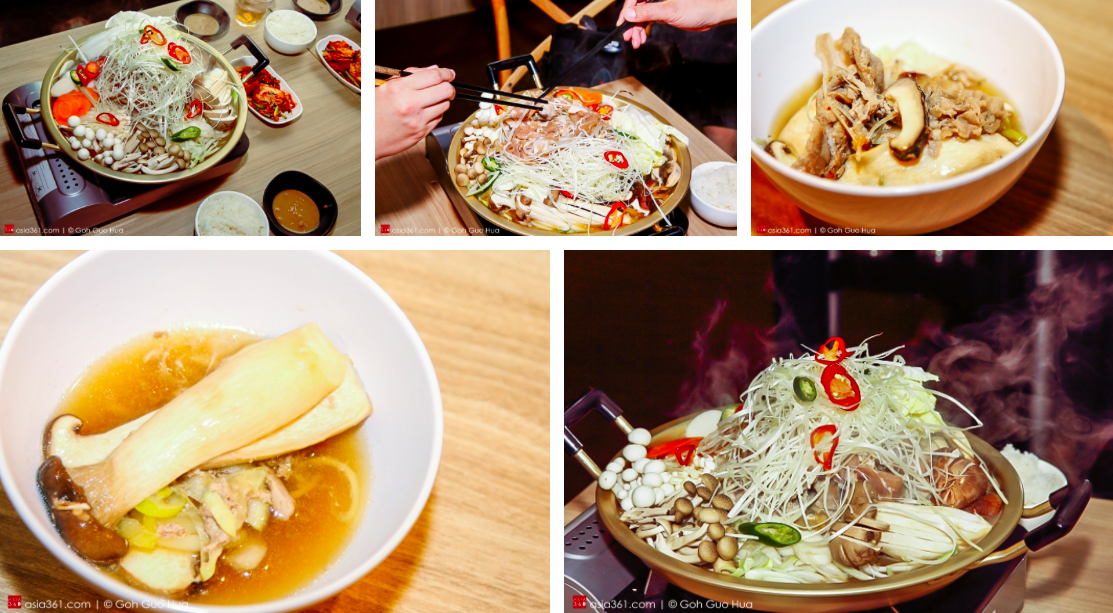 The Daeji Gogi Jeongol arrived served in a shallow brass pot, stacked high with mushrooms, leeks, carrots and pork.
The Daeji Gogi Jeongol arrived served in a shallow brass pot, stacked high with mushrooms, leeks, carrots and pork.
This is a light and healthy tasting dish, owing to the ample portion of vegetables. The pork broth was full flavoured and very tasty, with a hint of sweetness imparted by the addition of carrots and coils of leeks. The mushrooms provided an additional facet to this already bursting-with-flavour broth, with a whiff of an earthly aroma that characterises the unique flavour of mushrooms — almost like a mild lingering perfume or shadow.
In terms of texture, I liked the fresh crunch of the vegetables and meaty bite of the pork slices. Unlike mookata which is the closest thing I can draw a comparion to, the oil did not mingle and mar the soup. The contraption allowed for the oils to collect under the cooking surface, leaving the broth unsullied and pure.
The next Jeongol was called Haemul jjim dak. In his characteristic jovial manner, Mr Park exclaimed excitedly that it is like the Chinese dish Gong Pao, making a bid to bridge our two cultures. However, unlike the Gong Pao sauce, the Korean variety is notably much spicier and begs a competition as to who can stomach the hotter variety. There are 10 levels of spiciness to tempt the would-be challenger. We opted for the level two, to better appreciate the dish.
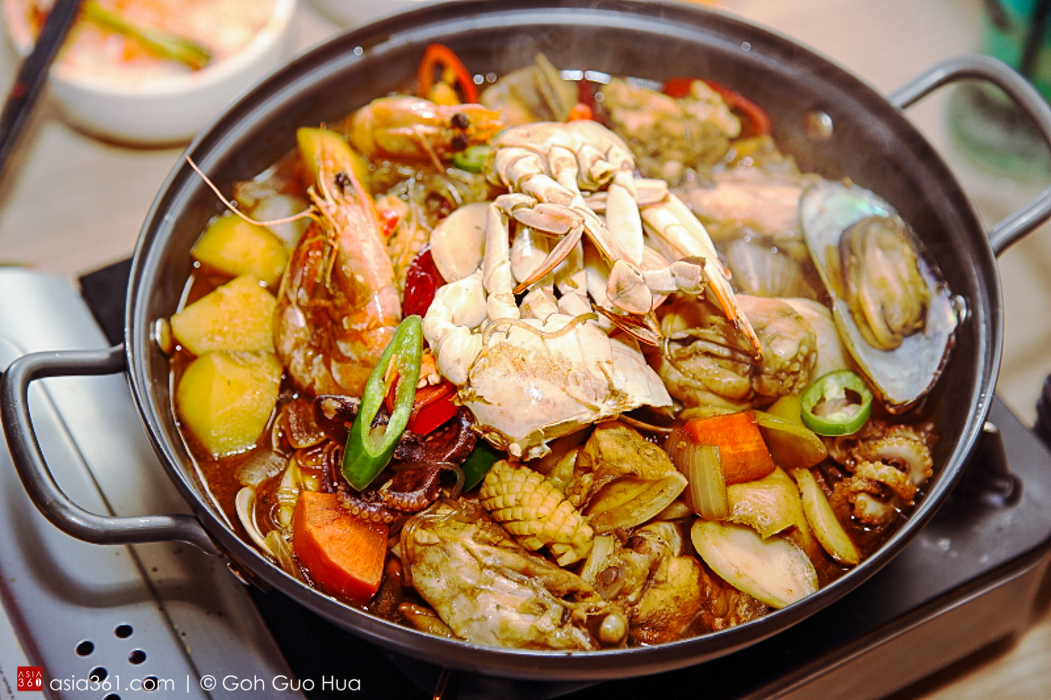
Haemul jjim dak is supposedly a poultry option but it seemed to me primarily a seafood dish. In addition to smooth tender chunks of chicken thigh meat, the pot was loaded with shellfish, crab, squid, prawns and baby octopus. To top it off, glass noodles were also added. A complete antithesis to Daeji Gogi Jeongol, Haemul jjim dak has a thick, heavy taste. It is sinful decadence versus salubriousness. At this juncture, it was necessary to put out the fire with a gulp of Bunhong – the peach cocktail that was closest to me.
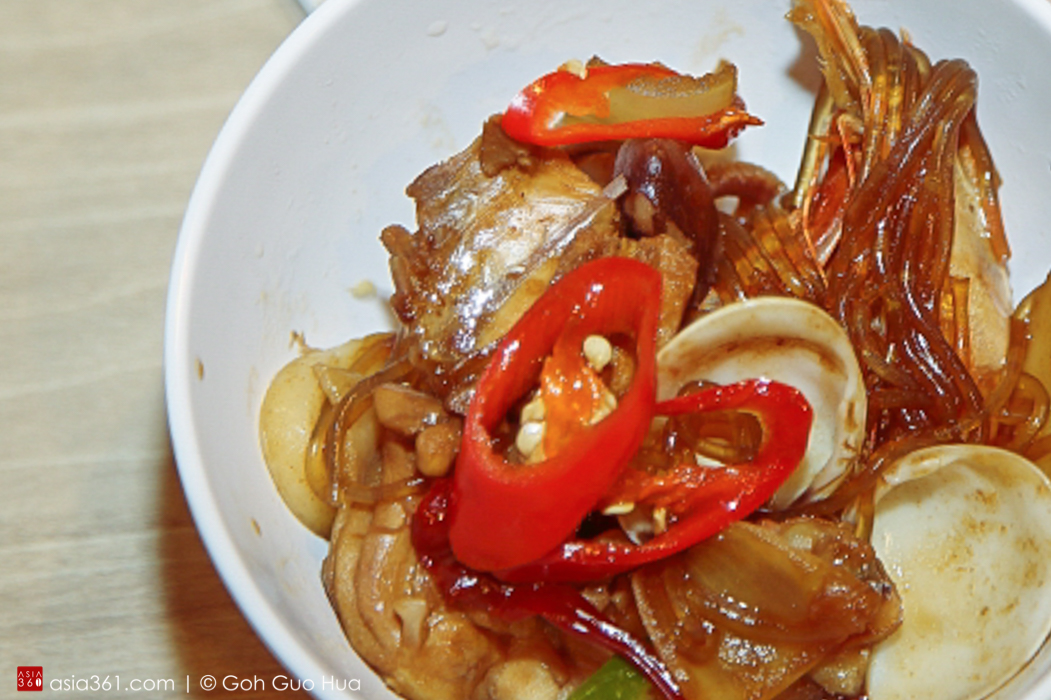 Crispy fried, lightly battered, the familiar Korean Fried Chicken ($3.90 for 1 piece, $11 for 3, $21 for 6) came in five variants – garlic, soya sauce, sweet and sour, spicy, and honey-glaze. We had the original, garlic and spicy-flavoured ones. The drum sticks were fried to a glorious golden brown, a colour so regal it was an instinctive reaction for me to raise it like a sceptre and sink my teeth in. The meat was nicely cooked throughout and retained all the wholesome goodness of the natural juices. The sticky sweet sauce coated the other two varieties, which had the consistency of warm golden molasses and was a hit with my companions.
Crispy fried, lightly battered, the familiar Korean Fried Chicken ($3.90 for 1 piece, $11 for 3, $21 for 6) came in five variants – garlic, soya sauce, sweet and sour, spicy, and honey-glaze. We had the original, garlic and spicy-flavoured ones. The drum sticks were fried to a glorious golden brown, a colour so regal it was an instinctive reaction for me to raise it like a sceptre and sink my teeth in. The meat was nicely cooked throughout and retained all the wholesome goodness of the natural juices. The sticky sweet sauce coated the other two varieties, which had the consistency of warm golden molasses and was a hit with my companions.
 I like this establishment for its authentic food and the spirit of inventiveness that Mr Park alluded to in Guksu’s future menu inclusions. For me, I could imagine myself coming back for the Daeji Gogi Jeongol as everyday comfort food.
I like this establishment for its authentic food and the spirit of inventiveness that Mr Park alluded to in Guksu’s future menu inclusions. For me, I could imagine myself coming back for the Daeji Gogi Jeongol as everyday comfort food.
Guksu Restaurant
3 Temasek Boulevard #02-385
Suntec City
Singapore 038983
Opening hours: 11 am – 10:30 pm daily

